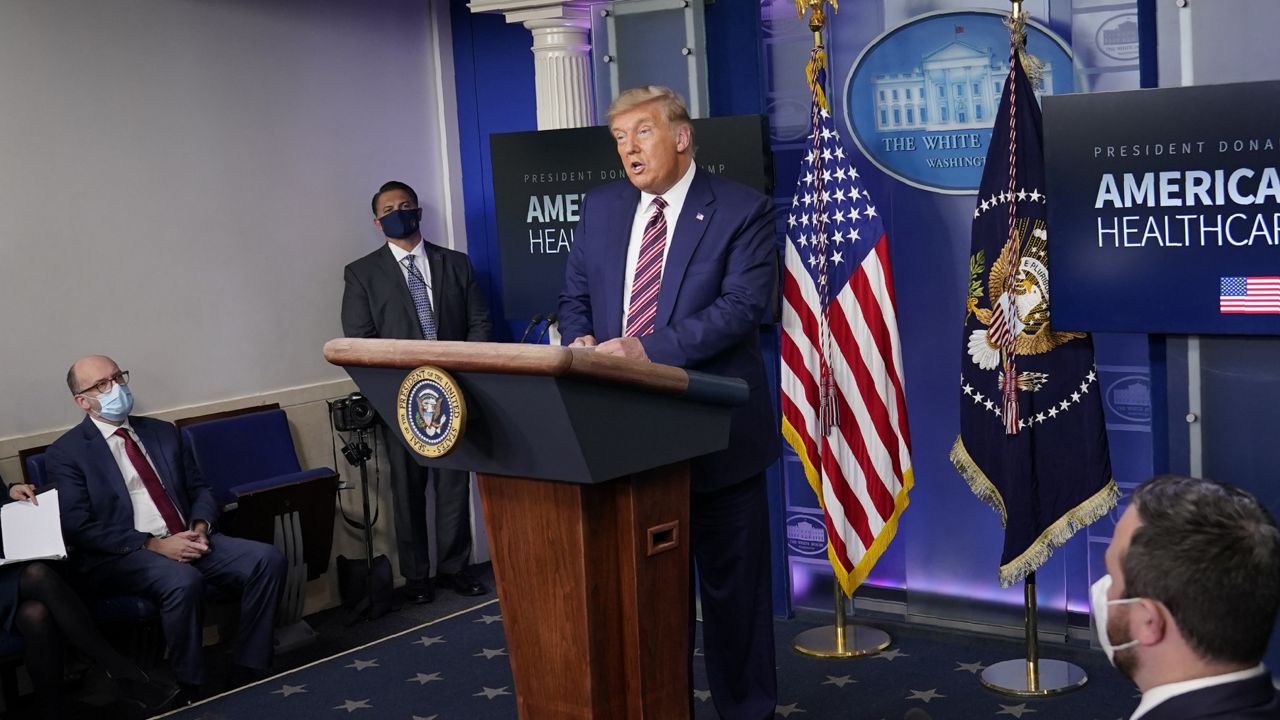President Donald Trump has scarcely been seen in the 17 days since the election, opting instead to push forward with multiple election lawsuits aimed at discrediting ballots cast for his opponent, Democrat Joe Biden.
That didn’t change much on Friday.
Despite appearing in person at the White House to announce new cost-cutting efforts for prescription drugs, Trump both maintained that he won the election and left without taking questions, ignoring shouted inquiries from the reporters gathered in the briefing room.
The briefing came as the president has grown increasingly frustrated with pharmaceutical companies that he claims slow-walked their COVID vaccines, thus impacting his election chances.
“Big pharma ran millions of dollars of negative advertisements against me during the campaign – which I won, by the way, but you know, we'll find that out,” Trump falsely claimed, before touting that he won "almost 74 million votes." (Biden's popular vote total is approaching 80 million, and Biden leads Trump 306-232 in terms of electoral votes.)
Trump went on to say companies like Moderna and Pfizer, both of whom have announced potential COVID vaccines, intentionally delayed releasing their findings “because of what I did with favored nations and these other elements,” in reference to his administration's new regulations, despite having not released the plan until after the election.
“Pfizer and others even decided to not assess the results of the vaccine … until just after the election,” the president said on Friday.
“The drug companies don’t like me too much. But we had to do it,” President Donald Trump said in announcing the new policy at the White House. “I just hope they keep it. I hope they have the courage to keep it,” he added, noting pressure from drug company lobbyists.
Scientists behind the Pfizer vaccine have repeatedly denied their vaccine announcement was delayed due to political purposes.
“Pharmaceutical research should never be politicised. It’s a question of integrity. Withholding information would have been unethical,” BioNTech/Pfizer chief executive Prof Uğur Şahin told The Guardian earlier this month. “What’s important for us is that we are developing a vaccine and we don’t play politics.”
The president’s disdain for pharmaceutical companies isn’t new, however; Trump came into office accusing pharmaceutical companies of “getting away with murder” and complaining that other countries whose governments set drug prices were taking advantage of Americans.
As a candidate in 2016, Trump advocated for Medicare to negotiate prices. As president, he dropped that idea, objected to by most Republicans. Instead Trump began pursuing changes through regulations.
The new finalized rules announced Friday will have two main effects. The first will tie what Medicare pays for medications administered in a doctor’s office to the lowest price paid among a group of other economically advanced countries. That’s called the “Most Favored Nation” approach.
The administration estimates it could save $28 billion over seven years for Medicare recipients through lower copays. It would take effect Jan. 1.
The second rule requires drugmakers for brand-name pharmacy medications to give Medicare enrollees rebates that now go to insurers and middlemen called pharmacy benefit managers. It would take effect Jan. 1, 2022.
The changes are opposed by those aligned with the pharmaceutical industry, but may be a mixed bag for Democrats.
Relying on international prices to lower U.S. costs is an approach also favored by Democrats, including President-elect Joe Biden. But Democrats would go much further, authorizing Medicare to use lower prices from overseas to wrest industry concessions for all expensive medications, not just those administered in clinical settings.
HHS secretary Alex Azar spoke with Spectrum News prior to President Trump’s Friday announcement.
“These special interests are powerful — the big pharma companies, the middlemen. They’ve run tens of millions of TV ads attacking the President, attacking me,” Azar said. “But he’s taking them on in a way that nobody would ever be willing to do.”
Both rules are sure to be challenged by members of the drug industry, but Sec. Azar said he’s confident in the rules’ legality.
“We think we’re on very sound legal footing,” he said. “Frankly, you’re talking about taking back from America’s seniors 30 percent average savings at the pharmacy counter …. [The president] is putting the American patient at the center of the healthcare system”
The Associated Press contributed to this report.



